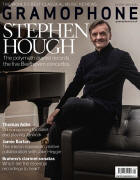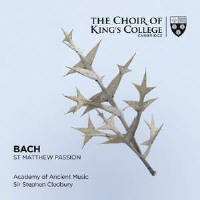Texte paru dans: / Appeared in: |
|
|
Outil de traduction (Très approximatif) |
|
|
Reviewer: Lindsay Kemp The death of Stephen Cleobury last November, seven months after he had ended his 37 years as Music Director of King’s College, Cambridge, can without fear of exaggeration be described as the end of an era. Here, on the choir’s own label, is presumably that era’s final manifestation on record, recorded at and around two concerts in the Chapel at last year’s Easter at King’s week. A time was, let’s say from the 1960s to the ’80s, when all-male choirs were very much the thing for historically minded performances of Baroque choral music: apart from the fact that these were notionally the voices Bach himself had (in whatever number), their clarity and agility contrasted strongly with the big choral-society sound that had prevailed from Mendelssohn’s day onwards. And indeed, it was the men of King’s College who contributed to Nikolaus Harnoncourt’s groundbreaking St Matthew of 1970. Since then, however, mixed-voice chamber choirs have taken over, and it is the college and cathedral choirs who have come to seem the throwbacks. That may explain why there has been no prominent King’s St Matthew on disc until now, only a little-noticed Vanguard release (later on Brilliant) taken from a live 1994 broadcast, subsequently released on DVD (9/03). In truth, the 1994 and 2019 versions do not differ much in approach. Cleobury is hardly a radical in this music, and in both performances he lets the music, the soloists and the sound of his choir speak pretty much for themselves, seemingly content to have brought them together with his customary care and innate musicality. Even some of the odder moments – such as the strangely lumbering ‘Sind Blitze, sind Donner’ – are near-identical. The biggest difference, indeed, lies in the solos. In 1994 Cleobury had a solid team of early-music regulars including Emma Kirkby, Michael Chance and Rogers Covey-Crump. The 2019 team is more mixed. Sophie Bevan has a darkish soprano that here lacks something in precision, but she gives us a heartfelt ‘Aus Liebe’ and delivers an ardent ‘So ist mein Jesus gefangen’ with countertenor David Allsopp. On his own Allsopp is light but focused, smooth and affecting, while bass William Gaunt is suavely lyrical. Tenor Mark Le Brocq and Matthew Rose’s Christus are in a different category, however; their imposing voices bring a resounding Wagnerian feel to proceedings – I don’t think I’ve ever heard a Christus sound as stern as he is here. James Gilchrist, in at least his third recorded Evangelist, is as bright, intelligent and articulate in communicating text as ever. The open King’s acoustic is a factor of course; the 1994 recording conquered it pretty nicely but the 2019 sticks fairly close to the performers – no bad thing for detail but sometimes unhelpful in terms of greater bloom and blend. One also gets the feeling that occasional moments of strongly marked articulation were designed more to cope with the space of the building than the intimate context of the recording. Yet it cannot be denied that the choir makes a splendid sound in the crowd choruses, and that the boys, though the tuning is not always spoton, can provide a creamy top line whenever required. If the classic English college choir sound in a fairly standard interpretation is what you want for a St Matthew, you won’t be disappointed with this release. If more dramatic incident and a deeper involvement is required, you might well prefer Harnoncourt’s third recording (Teldec/Warner, 6/01), John Eliot Gardiner’s second (SDG, 4/17), or the recent account from Masaaki Suzuki, which was Recording of the Month last issue (BIS, 4/20). |
|




